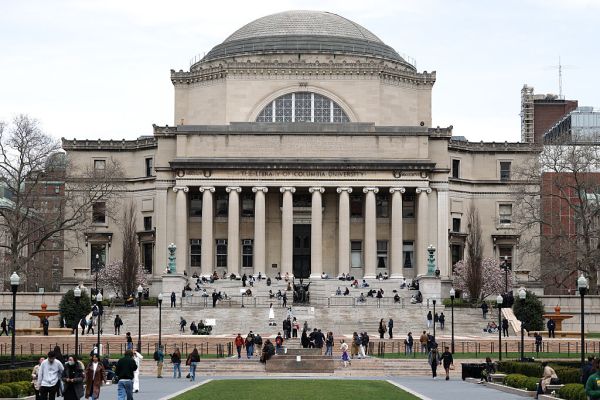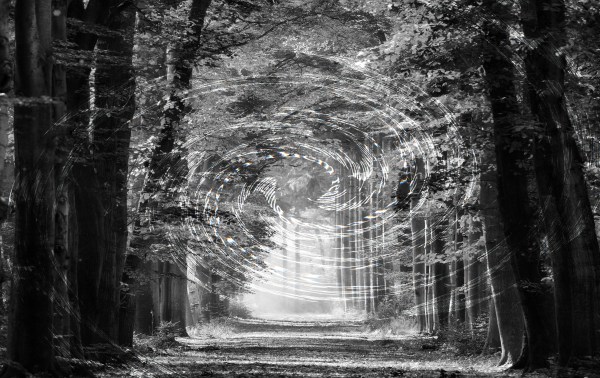Things are going badly for universities. They are in the crosshairs of an erratic and aggressive government willing to threaten anything in its path. While the government may have succeeded at securing promises for needed reforms at Columbia University, it did so by delaying or canceling scientific research funding estimated at between $400 million and $1.2 billion. But even delays that are resolved have their own costs: While a deal will restore this funding, some worthy scientists have lost their jobs and some worthy scientific research projects will not recover. To protect the sciences going forward, radical change to the composition of universities is warranted.
How do academics view the root causes of their own precarious situation? Consider a recent gathering of professors across multiple disciplines for the annual meeting of Heterodox Academy in Brooklyn last month. HxA, as it is known, is a group devoted to fostering the necessary environment and tools for airing of conflicting and unpopular (“heterodox”) views—provided they are expressed civilly. And yet, even among this group, whose members are not prone to marching in lockstep, there was remarkable consensus that the public’s distrust and the government’s ire are directed primarily at faculty in the humanities, because of their often single-minded insistence on identity politics, equity of results over merit, and abandonment of the Western canon.
The best argument I heard at the HxA conference in defense of the humanities in today’s university was: “We cannot afford to lose all of that important cancer research.” Come again? Translation: The humanities are going down and taking the rest of us—grant-funded scientists who focus on medical research or the physical sciences—with them. This begs the question: Do we scientists need them? Or, more to the point, must the fate of the sciences be tied to that of the humanities?
Since January of this year, the sciences have been hit with delays of some federal grants and cancellations of others; proposed reductions in indirect rate costs; and draconian budget cuts for the National Institutes of Health (NIH) going forward. Keep in mind, it is the humanities that have sinned: Why else would the Trump administration’s settlement with Columbia call for an internal review of Middle East programs or for adding new Jewish Studies faculty slots? But if the humanities have sinned, why has the government targeted the sciences for funding cuts? As Willie Sutton purportedly remarked when asked why he robbed banks: “Because that’s where the money is.” Most universities have divisions or departments of the humanities, social sciences, law, business, medicine, and hard sciences. But it is the latter two that bring in the bulk of federal dollars, in the form of NIH and National Science Foundation (NSF) grants.
The more funding science and medicine departments accept, the more leverage the government has to force changes at their universities. I am strongly in favor of shrinking bloated university bureaucracies and reforming or eliminating university entities that have gone over the cliff for social justice activism. But I am also a career biomedical scientist whose work depends on NIH grants, and I am less sanguine about my grants serving as the main component of the government’s leverage to force such changes.
Some will claim that scientists’ hands are not clean, that we endorse rampant DEI, that we misuse science funding for bizarre investigations. But such instances are a few fleas on the fur of a noble hound. We in the hard sciences do work that is largely apolitical, and we are more oriented toward much-needed objective evaluation of data and merit than many of our brethren in the humanities. Yet, the scientists, and all their life-giving and technology-producing work, are being punished for the sins of others because we all live under one roof. I cannot see a compelling reason for our continued cohabitation.
There is nothing that says that universities must or have always included all disciplines. My graduate alma mater (now named Case Western Reserve University) is the product of a 1967 federation (and ultimate merging) of what was the Case Institute of Technology and Western Reserve University. The idea of a large, prominent entity had been under discussion for many years, and may have been driven by the desire of city leaders to put Cleveland “on the map.” Nowadays, Case Western is consistently ranked in the country’s top 100 universities.
But not all unions are good or last forever. In January of 2000, America Online (AOL) and Time Warner merged to secure dominance of the entertainment and digital domains. But only a few years later, access to the internet became widely available for cheap, and AOL’s dominant position in controlling access via dial-up became worthless (AOL’s market capitalization went from $192 billion to around $3 billion in about eight years). When the dot-com bubble burst in 2001, AOL was dead weight that pulled down the stock price of the combined entity until there was nothing left to do but de-merge (called “spinning off” in business terms) in 2009.
More was at play in the AOL/Time Warner debacle than one division’s failed business model: There was a widely reported clash of cultures between the aggressive AOL leaders and the more staid executives of Time Warner. In the university, we also see a clash of cultures. Scientists at research universities run labs that are funded by government grants. To secure those grants, the scientist proposes a circumscribed set of experiments with verifiable (or more correctly, rejectable) hypotheses. Objective truth as it applies to such narrow lines of inquiry is attainable. But objective truth cannot be achieved in the humanities—nor is it the point. Professors in the humanities are trained in a completely different paradigm and culture. Writing about art or history or religion seems to elude any possibility of objectivity that is central to the scientific process. If you are a Calvinist, there may be only one proper way to read the Bible. But that is not the same as there being one objective meaning of the Bible for all of us.
From a practical standpoint, scientists with research labs are running small businesses. The goal of the lab may be a search for scientific truth, but the great bulk of the lab director’s time and focus is dominated by a search for funding, not truth or politics. An investigator in the sciences has little time for writing political position papers or worse, political screeds. Such writings would yield no benefit to one’s reputation as a scientist, nor to the funding and survival of one’s lab. We are trained to write objectively about the results of our experiments: The data are what the data are. In our grant proposals and in our peer-reviewed papers we report those data so that others can evaluate them as well as our interpretations. We must even note data that were excluded (as “outliers” based on objective criteria).
Objective reasoning is an important skill. We as a society depend on those who are trained to state clear hypotheses and analyze data objectively. Pasteur and others gathered data that confirmed the germ theory of disease. You may not like “elites” or the French, but you’d be a fool to let your doctor or dentist operate on you with used, unsterilized instruments.
There are undoubtedly scientists who abuse their positions and their funding to promote their politics. But they are a small or even vanishing minority. My experience from more than 30 years in science research is that my peers take their objectivity seriously. In my four-year stint on a review panel for NIH from 2016 to 2020, for example, I observed a group of 30 scientists of different specialties argue ardently, sometimes quite heatedly, but always civilly, about the merits of each grant we had to review. Never once did anyone impugn a grant on political or ideological grounds. We stuck to the value of the proposed science, the feasibility of the proposed experiments, and the potential benefits that would derive from them. Yes, scientists have sometimes been forced to include DEI statements and sometimes to use bizarre, woke language in papers or grant proposals. (I myself have been advised to write “a person who smokes” rather than a ”smoker” in a grant proposal.) But I would argue that these are mostly actions taken by reasonable people to escape the scrutiny of NIH or university-based language-police.
No matter the level of ideological capture in either, though, sciences and the humanities are organized differently, operate differently, and have different raisons d’être. It is almost as if the respective faculties are different species. Jewish law has something to say on this. It prohibits the yoking together of oxen with asses, because animals of different strengths and different strides should not be forced onto the same team. But the principle can be applied more broadly. In the modern American university, the sciences have historically been “yoked” to the humanities. Who are the oxen and who are the donkeys may be in the eyes of the beholder, but there is no doubt that at this moment, we in the hard sciences and medicine are suffering needlessly for being yoked, organizationally, to our counterparts in the non-quantitative and often ideologically captured humanities departments. Our strides and our strengths are incompatible.
Does this mean that scientists should strive to be illiterate or ahistorical? Of course not. We need to be able to read and write and absorb lessons from history and politics and ethics. But we don’t need to be part of a larger university to do so. For those topics that students need to learn but for which no scientist professor is prepared to teach, our Institute of Technology and Medicine can hire qualified instructors. But they need not be the world’s expert on Shakespeare or Poe to teach writing or English literature to undergrads. And for those polymathic students who want to learn their physics from a famous physicist and their Hobbes from a leading Hobbesian, there can still be such a thing as cross-registering at the nearby Institute of Humanities.
To be clear, I have dear friends who are historians and writers and journalists. They are brilliant, and I delight in their knowledge and in their perspectives. But we do not collaborate on my research on drug development or Parkinson’s disease or cancer, because frankly, they would have nothing to contribute. And we certainly do not need to be employed by the same organization. I am not against history or literature any more than the rabbis were against oxen. In fact, I am a fan of both history and literature. But not every species of academic or their fates must be yoked together.
We are at an inflection point in the public’s valuation of the academy. For good or ill, we academics must each make our own best case for our continued existence and for whatever resources we seek from the public. There is an efficiency and a clarity that can come from unyoking the sciences from the humanities. Let the market of public opinion assess each discipline on its own merits and let the practitioners of each discipline be allowed to make their own case for their continued value. That seems only fair. I am confident I can make my most persuasive case for a university of science, engineering, and medicine, if the humanities are not housed under my roof.









Please note that we at The Dispatch hold ourselves, our work, and our commenters to a higher standard than other places on the internet. We welcome comments that foster genuine debate or discussion—including comments critical of us or our work—but responses that include ad hominem attacks on fellow Dispatch members or are intended to stoke fear and anger may be moderated.
With your membership, you only have the ability to comment on The Morning Dispatch articles. Consider upgrading to join the conversation everywhere.